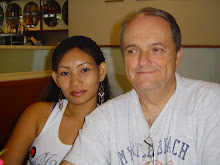The Lottery
The scene has an operatic quality
to it. Two Thai men by the side
of the road, buyer and seller, face
each other over an open portfolio
of lottery tickets stapled in neat
rows until they look like fish scales.
The buyer is slouched with his
banged up step-through scooter
attending him like a horse he has by
the reins. The man’s lower lip is
rolled over as he solemnly searches
the ticket numbers for a correspondence,
a synchronicity, a religious epiphany,
that he alone can see to find a winner.
From stage left I enter, the Basso
in Bermudas, the flip-flop shod
farang, sweating, stopping to clear
a stone from his shoe, while cursing
and lamenting his western lot in song.
The seller, wearing a dress shirt and
wire rimmed glasses greets me in
his alto’s voice, although not by name.
We have a short duet where I shrug
and he shrugs because I do not care
to pick my own ticket. What’s the
use I sing when all tickets have the
same odds. At last the tight-lipped
seller reaches over the black portfolio
and snatches one for me. We exchange
money for hope with an abrupt
music-less punctuation.
Then, as I walk off stage, the poor
buyer, in his tenor’s voice, begins
his sweet song: I have only the price
of one ticket to my name, I will not
eat and drink for a couple of days
if I do not win a prize, I must buy
a funeral for my mother, my son
needs money to marry . . . .
The seller and I only provide a
manly register for this pathos,
this orison, which turns and climbs
in the air, riding the thermals up like
a soaring bird above this rice field land.
FG March 21, 2012
All rights reserved by the author Forrest Greenwood.
to it. Two Thai men by the side
of the road, buyer and seller, face
each other over an open portfolio
of lottery tickets stapled in neat
rows until they look like fish scales.
The buyer is slouched with his
banged up step-through scooter
attending him like a horse he has by
the reins. The man’s lower lip is
rolled over as he solemnly searches
the ticket numbers for a correspondence,
a synchronicity, a religious epiphany,
that he alone can see to find a winner.
From stage left I enter, the Basso
in Bermudas, the flip-flop shod
farang, sweating, stopping to clear
a stone from his shoe, while cursing
and lamenting his western lot in song.
The seller, wearing a dress shirt and
wire rimmed glasses greets me in
his alto’s voice, although not by name.
We have a short duet where I shrug
and he shrugs because I do not care
to pick my own ticket. What’s the
use I sing when all tickets have the
same odds. At last the tight-lipped
seller reaches over the black portfolio
and snatches one for me. We exchange
money for hope with an abrupt
music-less punctuation.
Then, as I walk off stage, the poor
buyer, in his tenor’s voice, begins
his sweet song: I have only the price
of one ticket to my name, I will not
eat and drink for a couple of days
if I do not win a prize, I must buy
a funeral for my mother, my son
needs money to marry . . . .
The seller and I only provide a
manly register for this pathos,
this orison, which turns and climbs
in the air, riding the thermals up like
a soaring bird above this rice field land.
FG March 21, 2012
All rights reserved by the author Forrest Greenwood.


0 Comments:
Post a Comment
Subscribe to Post Comments [Atom]
<< Home